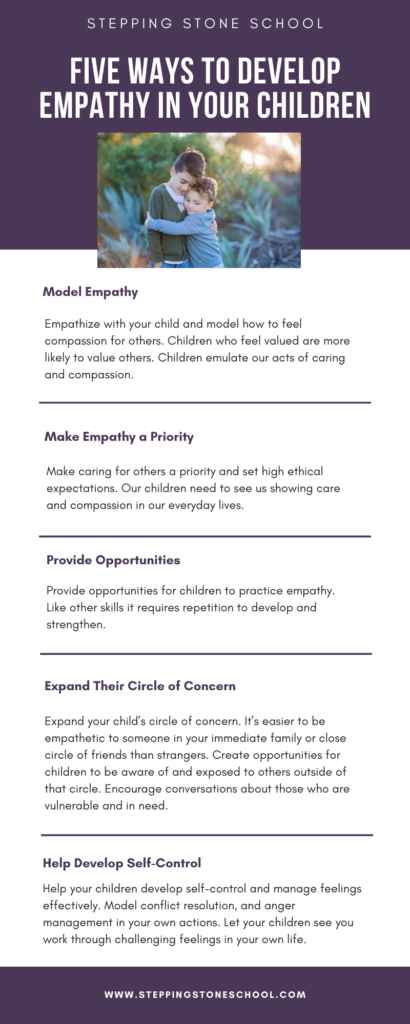Five Ways to Develop Empathy in your Children
The definition of empathy is the ability to identify with or understand the perspective of another and share their emotional state. Empathy involves putting yourself in the place of another. It is dependent upon a person’s ability to feel their own feelings and be able to identify them.
Dr. Michele Borba, the author of the book, Unselfie: Why Empathetic Kids Succeed in Our All-About-Me World, believes our world to be in an empathy crisis. She found that today’s teens are 40% less empathetic than they were 30 years ago. Lack of empathy can hurt your child’s academic performance, can lead to bullying and correlates more with cheating and less resilience.
Several years ago, Harvard University’s Making Caring Common Project released a report entitled,The Children We Mean to Raise, The Real Messages Adults are Sending About Values. The researchers found that although parents talk about instilling values and empathy, children may value academic achievement and individual happiness over caring for others. They found that the children’s values reflected what they believed the adults in their lives valued.
The study offered five suggestions for developing empathy in children:
- Empathize with your child and model how to feel compassion for others. Children who feel valued are more likely to value others. Children emulate our acts of caring and compassion.
- Make caring for others a priority and set high ethical expectations. Our children need to see us showing care and compassion in our everyday lives.
- Provide opportunities for children to practice empathy. Like other skills it requires repetition to develop and strengthen.
- Expand your child’s circle of concern. It’s easier to be empathetic to someone in your immediate family or close circle of friends than strangers. Create opportunities for children to be aware of and exposed to others outside of that circle. Encourage conversations about those who are vulnerable and in need.
- Help your children develop self-control and manage feelings effectively. Model conflict resolution, and anger management in your own actions. Let your children see you work through challenging feelings in your own life.
Practicing empathy daily, will help to ingrain it in your children’s lives and become a natural part of who they are.
The following are some activities and actions you can incorporate into your family’s life:
- Point out when you see someone else being empathetic.
- Volunteer as a family and discuss the experience.
- Read books and watch movies that explore and promote empathy.
- Use experiences as teachable moments and praise your children and others when you see them being empathetic.
Stepping Stone School provides books on teaching your children empathy in our parent lending library. Ask your principal to show you these specific books and feel free to check them out to bring home.
There are also many children’s books that teach empathy which we use in our classrooms. Again, your principal can show you these books should you wish to purchase some for your own use.
To learn more about our Kindness and Empathy Curriuclum™ click here!
